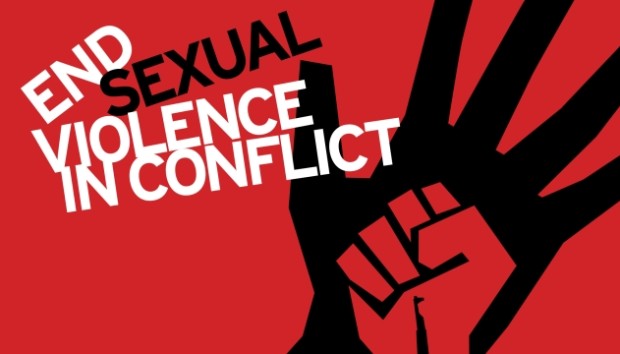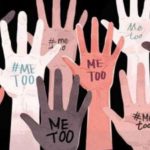Sexual Violence as a peacetime-wartime continuum: Part 2; Why is Sexual Violence common in War zones?
While wars take humanity to task without discrimination, it is the women who are known to be the worst sufferers of conflict. Though it is often easier to believe that it is those that serve in armies that suffer most, war inflicts greatest sufferings on women. Women are forced to provide for their families against all kinds of adversities, as the responsibility of being a breadwinner falls on them with their men being on the battlefield. They are made to find a means to live in the face of a stark threat to their existence. If they don’t make a means to find a livelihood, hunger kills women and their families. If she makes her way out to run the gauntlet of war, sexual violence looms over her head like a sword waiting to drop. The bodies of women become battlegrounds. Combatants and non-combatants exploit women sexually.

In my last post, I spoke about how sexual violence is an element that subsists in a peacetime-wartime continuum. However, the occurrence is multiplied many times in a conflict setting. What is it that makes sexual violence so common on every war front, and after?
Rape and sexual violence at the micro level can be a product of lustful intentions, mental disorders or depravity, as criminology offers. However, at the macro level – where the cases are not individual instances, but a collective of several individual instances that happen at dizzying speed, it is about dominance. As men fight in the war, there is a tendency towards wanting to break the enemy. Any victory is a victory: no matter how small, or how big it may be. A recent article revealed that a soldier came forth to say that they did whatever they wanted in war, and he himself had raped 53 women. Sexual violence is deployed as a weapon of war because to the user, it is cheap, easy and extremely effective in achieving the target of breaking the enemy. When combatants rape by the dozen, it isn’t just about sexual urges, but about seeing the women of the enemy – sometimes just women – breaking before them, physically, emotionally and mentally. To them, that is a sadistic “victory”, or in more graphic terms, a way of “winning a war”. Rape and sexual violence in conflict are not about sex or lust, but about dominance, and about taking sexual violence in peacetime to a bigger scale.
And in many ways, using rape and sexual violence as weapons in war is a part of a strategic plan, like Gaddhafi’s Viagra campaign. Why is it so easy to deploy rape and sexual violence as part of campaign dynamics?

When a woman is subjected to sexual violence in any form, she suffers not only physical or psychological damage but also suffers a stigma. Encumbered with the added trauma of humiliation, families turn these women out of their homes. When women are spurned from their own homes, the backbone of society is broken. Men refuse to marry women subject to sexual violence. Married men don’t want to welcome these women back into their lives, for, in their eyes, they are “used goods”. These are not just by-products of sexual violence. These are planned and anticipated results. In that sense, sexual violence is calculated, brutal and absolutely bereft of humanity. Using sexual violence as a modus operandi in warfare is driven by an unhealthy and hegemonic desire for power. War is about using tactics that drive fear, humiliation, and destruction into the opponent society, to denigrate and erode the sanctity attached to the fabric of any peaceful society. The ulterior motive for it is that their conduct would invariably break down society entirely. Sexual violence in conflict and post-conflict situations, therefore, becomes for the warring factions, a preferred method that is used to reinforce gendered and political hierarchies.
Read Part 1 HERE
About the Author:
 Kirthi Jayakumar is an activist, artist, entrepreneur, and writer from Chennai, India. She founded and runs the Red Elephant Foundation, a civilian peacebuilding initiative that works for gender equality through storytelling, advocacy, and digital interventions. She also founded and runs fynePRINT, a feminist e-publishing imprint. She is a member of the Youth Working Group for Gender Equality under the UNIANYD.
Kirthi Jayakumar is an activist, artist, entrepreneur, and writer from Chennai, India. She founded and runs the Red Elephant Foundation, a civilian peacebuilding initiative that works for gender equality through storytelling, advocacy, and digital interventions. She also founded and runs fynePRINT, a feminist e-publishing imprint. She is a member of the Youth Working Group for Gender Equality under the UNIANYD.
Kirthi is an author and released her debut novel in 2017, titled The Doodler of Dimashq. Her second book, The Dove’s Lament, made it to the final shortlist for the Muse India Young Writers’ Literary Award.
Kirthi coded an app for survivors of gender-based violence called Saahas, which works as a web and mobile app. She taught herself to code and created a web app, a mobile app, and a Facebook ChatBot to support survivors of gender-based violence across 196 countries, and to assist bystander intervention.
In 2016, Kirthi was invited to Michelle Obama’s United State of Women Summit at the White House in Washington DC, as a nominated changemaker. In 2017, she was one of the youth activists invited to attend President Obama’s Town Hall at New Delhi.
Kirthi has spoken at TEDx Chennai, addressing Peace Education as a means to end Bullying. She has also spoken at FICCI FLO, as one of the youngest speakers to address the members. She was also a speaker at the Economic Times Women’s Summit 2018. Kirthi has also had the distinction of addressing the UNV Partnerships Forum on her work as an epoch-making online volunteer with the United Nations.
Kirthi is the recipient of the US Presidential Services Medal (2012) for her services as a volunteer to Delta Women NGO, from President Barack Obama. She is the two-time recipient of the UN Online Volunteer of the Year Award (2012, 2013). She received the 2016 Orange Flower Award from Women’s Web, the 2016 World Pulse Impact Leader Award and the 2017 Empowerment Leader Award from the Dais Foundation. Her work has been published in The Guardian and the TIME Magazine. She was recognized by EuropeAid on the “200 Women in the World of Development Wall of Fame in 2016.” She received the Digital Women Award for Social Impact in 2017, from SheThePeople, the Person of the Year (Social Entrepreneur) 2017 from The Brew Magazine. Kirthi is a recipient of the Yuva Samman from MOP Vaishnav College, in January 2018. The Red Elephant Foundation received the FICCI FLO Outstanding NGO of the Year Award 2018, and the UN Online Volunteering Award 2017. Kirthi was also among the six women featured on Facebook India on International Women’s Day in 2018.




Leave a Reply